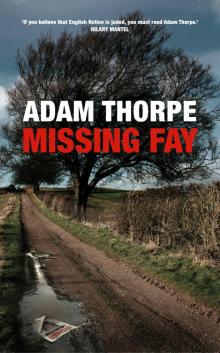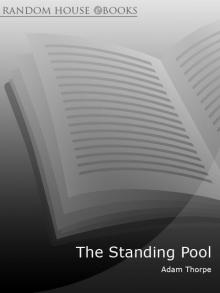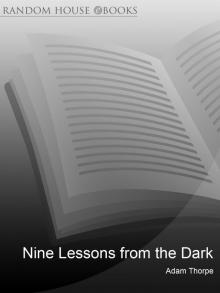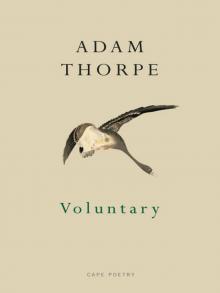- Home
- Adam Thorpe
Hodd Page 19
Hodd Read online
Page 19
How better would it have been if Edwynne had stayed as my rival scholar! Instead, perceiving a great need for weaponry,280 there being at that time a general order from the king for 100,000 [crossbow] bolts, and their iron heads at so many pennyworth per thousand, Edwyne apprenticed himself to an armourer in Yorke.
‘Nay,’ he quoth, as answer to our protests, ‘there is no finer profession, for I shall forge swarms of arrowheads and bolts with which the infidel shall be harassed, and beat out two-handed swords as sharp as cuttlefish, but of such tempered strength they might cleave a man in two to make him less than one – happy arithmetic! And I shall quench281 chain-mail and closed helmets for the best knights [optimos milites] that the defenders of the one Faith be not harmed by the forces of Satan, whose skill with steel is not as advanced as our own.’ And I remember he did boast that he would earn 10d a week straight away, which seemed to me a princely sum at that time: for to get and to win is all men’s care, though Edwine was driven to it by his father’s ruin. And our master said naught but wrote out upon the sand that passage from Ezekiel [xviii, 20] that beginneth: Filius non portabit iniquitatem patris [The son shall not bear the iniquity of the father].282
Secretly within myself I was glad my fellow scholar was departing, for my jealousy was swollen like a ripe weed; and my pride, pushing upwards against its tendrils, had not light enough to grow. Ed[w]yn embraced the hermit his master, who wept that his favourite disciple was to leave the path of holiness, and sacrifice his letters to pompa militaris gloriae.283 But Edwyn assured him, in all earnestness, that one day this humble pupil would be the chief armourer of the land, and that on each helmet would be engraved gyf thou not stodyst thou art slogh yn Goddys servyse, and on each sword, fecit se liberum,284 these being the first sentences in English and Latin he ever wrote.
This made the hermit laugh for the first time in many weeks, and Edwinn seized the harp and delivered a song of the famished poet’s desire for the downy flesh of a quince apple [cotoneum malum], which his love fever alone might soften to sweetness, with honey poured into the fruit’s moist vale (for there is always such a cleft in that fruit’s bare roundness), that its firm voluptuousness be all his fare, for there is no quince its equal in all of Cydonia.285 And so well and passionately did he sing this, that the hermit watered at the mouth, and quite forgot that it was far from being sacred music, and wept again when his favourite pupil took his final leave, with many a passionate embrace.
Then was I alone once more with the hermit, and ever eager to learn and better myself – not for the sake of the Lord’s service, but for mortal ambition (which is, in truth, constructed of dust). Yet that foul, blind moth did awaken from its lair forthwith: for that long-ago autumn brought gales, and shipwrecks, and this in turn caused me to abandon my first and best master in the most odious way.
Here I shall recount it forthwith, for it must be revealed before an ever greater and more odious act be likewise confessed to, that the reader might witness the ordered nature of any descent towards eternal damnation, as down a flight of stairs or a ladder, though it start with a trivial step, and finally alight on the verge of a grassy forest way, beside a felon.
Such a sea-wind did come, one day, that it amazed all. I, being in my village, heard it first as a swowing286 in the twisted pines along the track that led to the sea; taking cover from its wroth, I did not witness at first hand how, lifting the ocean to veritable mountains, it drove it against ships, that many were lost, and their men with them. Many believed that it was the beginning of the Last Day, for so dark did it become as if with a dragon’s vapour, that lanterns were lit at midday, and horses and mules froze as if in ice, rolling their eyes in terror. Then a certain rarefaction of the air caused birds to drop from the sky, and dogs to groan like their masters, and many dwellings lost their thatch; and trees were unplucked, crushing the common folk in their houses wherein they had cowered in fright; while in certain places the fields not yet harvested were ruined by hail, that none had ever before seen fall so in the summer.
Thunderclaps sounded, and lightning flashed, as greatly as was witnessed in the thousandth year after the birth of Our Lord and Saviour, yet nowhere did rain drop more than a quart upon our heads, and it was as warm as ale. When a certain priest took a cross and holy water, and with a few others of his church paraded to a hill I know, said to be sacred in pagan times, to banish the devils amassed under it (that were abetting the storm), he was joined by many of the faithful. As all of them walked there, singing their litanies, an intolerable stench came on the wind, worse than the breath of a thousand Jews or infidels, and rotten fish dropped from the sky on their heads, e’en very large ones that crushed the priest and wounded three others; yet where the holy water fell, a shrieking was heard under the grass and a pearl the bigness of a hazel-nut lay there, from whence the smell of a honeycomb rose up, that overpowered the stink (though some said that the perfume was of violets), whereupon the pearl vanished that none should quarrel over it, and soon after the wind calmed and the light returned.
I hurried down to my master before the storm had fully passed, the air still blustery but the sky’s upper waters no longer churned black, and saw from the cliff how the sea was a strange blue-green colour, as of a bruise, and that it was flecked by white in many places, but not mountainous: rather, it was overdriven [fatigatum est] in its tussle with the wind, and its foam on the shore was yellow, as men’s spittle be when they have fasted and are weary (and which is venomous to adders and other serpents). Many broken things were washed up on the shore, from ships and boats and the bottom of the deeps; yet I perceived, as I ran along the beach, no corpses therein.
Surprised to see my master praying in his [circle of] stones, as if naught had threatened us all with the End of Days, I almost cried out in my relief. E’en more astonished was I to hear that same cry in the mouth of another, coming from the sea; and turning my head I first saw nothing but the hilly brine, and felt sore afraid: for the cry seemed to be the sea itself, speaking through its noises, as oft a mill-stream will appear to shout. Yet neither sea nor mill-stream have minds, as trees and flowers do not.
Then, as I looked, I saw a head in the water, far off, and a hand – for a man was clinging fast to a great spar of wood, waving his arm. Yet he was too far off to touch, were I to enter the water to my neck, wherein I would drown, for only fishes know swimming (and a few foolhardy men, it is said). My master was deep in meditation, his eyes white that were rolled up to the sky, and his hands clasped tight before him.
I ventured into the sea up to my knees and was sore afraid, for the water and the yellow foam bit at my flesh, still angered after the storm, though with weariness in it. I hailed the fellow without reflecting that mayhap this was a demon sent to lure my master or his disciple into the briny deep. The fellow vanished then reappeared closer, clinging still to the plank, his cries now palpable above the sea-surge that clapped [ferivit287] against my legs; so near he was that I could see, when the swell permitted, the crooked nature of his nose and his rivelled skin, that was a sailor’s, and the shirt torn about his neck.
Desperate I was to throw a rope at him, and I shouted back that I would fetch the rope, no longer afeared of disturbing my master, for a man’s life was in peril. His shout returned over the surge, gladsome and eager, for he did see salvation nigh at hand, after what dreadful perils only the Lord knew, that had consumed his fellows. I fetched an old ship’s rope from the cave’s store, and threw it with much crying out towards the sailor, who had drifted sideways but not an inch nearer.
Still my master kept his eyes up to heaven, and I blurted out (for the thick rope fell short, my strength being only that of a child’s), ‘Master, prithee help us! There is a drowning man needs to be saved!’
I drew in the rope and cast it again, but the water having entered it somewhat, it was heavier still, and fell short once more. I cried again for help and this time, with the effort of a giant, after advancing up to my waist in the broi
ling [water], the rope came very near – but the man, in reaching out for it, lost hold of the board at a sudden shift of the waves, and slipped between them, and vanished from my sight. And then the waves, as if greedy for more provender, or like a lioness with her whelps, did boisterously sweep me from my feet and I fell and the water came over my head and methought I was drowned as boys oft drown in flooded pits and rivers and so forth, not finding air and stifling like any beast doth, unless the air gathered within the lungs be held in.288 And there being no air held in, I stifled with a great and horrible seething in my brain, but the Lord throwing me up at that instant as if taking my neck in his holy mouth, and casting me onto the firm sand, I tasted air that set my lungs moving once more, for they were not too grieved; and being the bellows of the heart, they must not cease moving or extinction cometh swiftly as to a fire not blown upon.
Throughout all these travails, my master did not stir from his prayers, yet he was very close. I was weeping, for I had tasted death, near stifled by the waters; and also I saw the sailor no more, and knew he had drowned. Afterwards by an hour or so, when I was sitting before the cave grieving inwardly, yet never ceasing to scan the ocean for the lost man – my ears still plugged by seawater, that had entered me even to the roots of my brain – my master stirred at last from his prayers, and stood and came towards me with an elated look upon his face. ‘I took the vow,’ he said, before I could utter a word, ‘never to be disturbed or interrupted in my prayers, and though the Devil tempted me with the most skilful of temptations, I did not yield.’
I said to him, thinking he must have been tempted by devils dressed as shapely harlots, or such like luxuries: ‘A man drowned, and I too was nearly stifled by the waves.’ ‘I prayed for thee,’ he replied, ‘and the Lord answered.’ I asked, in a shaky voice: ‘And didst thou pray for the man?’ ‘Nay, for I was hearing the song of the angels, and contemplating the great fountain of Paradise, that is full of enamelled fishes chanting night and day, that lull the listener to a sleep softer than goosedown, when your cries came from far below.’
And so disgusted was I, in my childish ignorance, that I burst again into tears, lamenting the worthy English sailor with the crooked nose, that I had nearly joined in death, and who might have been saved if the hermit my master had interrupted his prayers to cast the rope, he being of full-grown strength even in his thinness, with the two of us to haul it in.
My master seized me by the shoulders, and shook me until my teeth rattled, saying: ‘Miserable boy! Dost thou honestly think that such a sacred and heavenly vision should be cast aside for such an earthly temptation? For e’en if it was no such thing, and not sent by the Devil to waylay me like a robber might a pilgrim, dost thou not consider that such a man might be full of sin, being a sailor, and lewd and licentious as sailors are, and ripe for Hell?’ I broke away from his grip, and sat upon the rocks a few yards from him, trembling and nauseous.
My master continued, in a louder voice that I might hear above the surge and the gull-cries: ‘Perchance he will be rewarded for his trouble, for God is ever merciful, and on seeing how I remained steadfast in my truer pursuit, He will regard this miserable fellow as a holy martyr, and shower virtue upon his head, and lead him through the gates of Paradise to the succulent fruits and sweet fountains of eternal bliss!’ And so saying, he walked away from me up the beach with a jug, as was his wont after prayer, to collect water from a spring that splashed from a cleft in a remoter part of the cliffs and made a winding channel to the sea.
The miserable fellow was no doubt sent by Satan; for by him and my own folly, I lost the holiest and best master any disciple could ever have, and much more besides, that I pray to have life enough left me in my great age, to recount in its proper place.
And by this means, I gained another who was kind, but weak and fleshly under his sacred tonsure; that being brother Thomas. And I left him also – unfaithful wretch that I was! – for yet another whose soul was an empty larder, without so much as a dry bone within; for the Devil had taken all and filled it with cockroaches. And that was the heretic Robert Hodd, whom I now think was feasted upon by that most fearsome, hooded accomplice of Satan, named Despair.
Alas, that I must recount such events in my life, with the demons jangling at their successes over my shoulder, like men and women at a puppet play! But all must be revealed in the hope that, by so doing, I may confess, and cancel my debts – not like a begging student imploring his father to pay the barber’s, the baker’s, the tavern-holder, but like a true penitent whose feet bleed with the effort, and has scarce strength enough to crawl up the holy steps to his conclusion, after such a pilgrimage.
For the harp that was the hermit’s, and never mine, I stole.
That is to say, upon fleeing my first master’s presence, I took what I believed he no longer needed, for all luxuries be a temptation. In truth, I scarce reflected as I took it; for so disgusted was I by his behaviour, and tormented by the sight of the drowned man’s hope-sprinkled face in my brain, hanging there like a horrible mask upon the wall, that I seized the moment of my master’s absence (he filling the jug past the rocky headland), to snatch the instrument and – horrible sin – the Holy Book, and then scrambled away without a backward glance.
Ah! but a mere child was I, dear reader: deprived of a true father, still grieving my poor dear mother, inflamed by my late success before the courtiers, shedding bitter tears for a drowned stranger and for my own near-stifling in the waters that only the Lord’s mercy saved me from, I was but a sapling twisted by contrary winds, and the blows and buffets of a short life.
Did I not reflect that I was only saved myself from drowning by the power of my master’s influence – that the Lord might not have answered the prayers of most other men with such promptitude? Nay, I did not.
It is my belief (with the wisdom and knowledge of years), that devils were swimming in the yellow foam: for they say that the lake of Purgatory is cold and very salty, and therefore must be supplied by the sea, and this makes an easy passage for the fiends in the shape of salmon, that leap great heights to the mortal world. And seizing their opportunity (for I was rendered weak), they entered by my ears and mouth and nose, along with the bitter waters, and took up residence within me; there to spawn to their heart’s delight, until I finally turned from the sinful way and strove for purity within the shadow of this very cloister, that faceth the same waters I ne’er approach too close.
5
Here cometh my late master, brother Thomas, upon the wide wood-way, with his little page clept Henery, as you well know! Why do I see golden light behind them, as of a great brooch flashing, and goosedown wings pressed together above their shoulders, as though they angels be? O miserable worm that I am, even then I had some inkling of what terrible mortal sin I was about to commit; for upon hearing their gay chattering on the May breeze, and the soft bearing forth [fetus] of their lives northward on the broad and grassy way, I began to shake and quiver in my maidenly disguise, that if I had been carrying my bow – that is a fighting man’s third arm, as must a sword be – it would have fallen from my shoulder.
We had been waiting no more than two hours, when they came.289 Litle John was hid with our mounts behind a great bush further up, on the turn of a curve, and I whistled a warning. Slithen up to join him, I rode out behind [him] onto the green-hued road, that we might appear as if travelling northward also, but slowly, and not crouched in ambush (for the highway there did not expose much of its far length to the eye). And so we heard, as we walked our horses at a slow gait, the [harness] jingling behind us of the riders, coming around the corner at an amble, and swiftly they appeared alongside.
My old master was half hid by his wide hood with its edge of embroidery, as I was [hid] by my maiden’s veil and capuchon, in which my skin could be glimpsed, white as a swan. And Littl John was dressed as a merchant, with a woollen cap too small for him, and a green cotte likewise falling well above his calf, for they were fine clothes robbed an
d not made for such a giant: and I was sure, with my heart playing japes within me, that he would be seen as a felon, for his swollen face was yet rough, though his sorrel [courser] was very fine and handsomely girthed almost like a knight’s, and upon it he had slung leathern bags, as if fat with wool.290
Yet he did so bellow his greeting, and with such fawning friendliness, that e’en I was astounded. ‘Hail to thee, holy monk,’ he cried, and my late master and Henry returned the greeting, the whiles I near swooned from fear. ‘Hast thou come from afar?’291 asked my feigning father, and brother Thomas told him, in that sparrow-voice of his, that was like a pecking at my heart, ‘From Notyngham only.’ Thus we rode our horses at a walk two by two, with Henr[y] beside me and our elders in front.
I, keeping my face lowered as if in modest mien, yet saw a leathern bag shaped like a harp behind the saddle [of Henry’s pack pony]; and seeing this, the boy boasted of its beauty, that he promised to show me, and that it was made of sykamoure292 and carved finely about the edge with the semblance of leaves and fruit.
No less horrible it was, to see how brother Thomas fawned upon Litl John, thinking him a rough and powerful merchant, while the golden boy simpered beside me, thinking me a sickly girl who coughed (to feign better, as Lazarus doth when dying in the play). I said naught, for my voice was like a cracked pot, manliness coming into it at that time, and I could not disguise it like a play-actor. ‘My father was also a merchant,’ said Henrie, ‘but he drank what he was meant to sell, which is no great profit to aught but the belly; and now he resembles that scarecrow,’ he added, pointing to the field, and brother Thomas laughed in delight at his simple merriment, while Llitul John feigned the same delight.
And there being a field of rye all about [the scarecrow], the crop already grown to above the knee and blowing most prettily with wild flowers and rue and fennel, the golden boy prattled of the delights of spring; and broke thereupon into song, a song that I once sang of cuckoos, seed and green leaf,293 yet with such sweetness to his voice that even Litel John was drawn, listening. For no man can resist the honey of music, when it be well delivered, for it soothes the foremost cell of the brain, even unto bringing the infection of madness out of it. But so deep in me were the servants of the Arch-fiend, after the months I had spent in proximity of his breath and influence, that this song of Henery’s merely maddened my jealousy, and swelled my sinews [nervos],294 so that I near bit my veil.

 Missing Fay
Missing Fay Hodd
Hodd Pieces of Light
Pieces of Light The Standing Pool
The Standing Pool Ulverton
Ulverton Nine Lessons From the Dark
Nine Lessons From the Dark Flight
Flight The Rules of Perspective
The Rules of Perspective From the Neanderthal
From the Neanderthal Is This the Way You Said?
Is This the Way You Said? Still
Still No Telling
No Telling Voluntary
Voluntary Between Each Breath
Between Each Breath